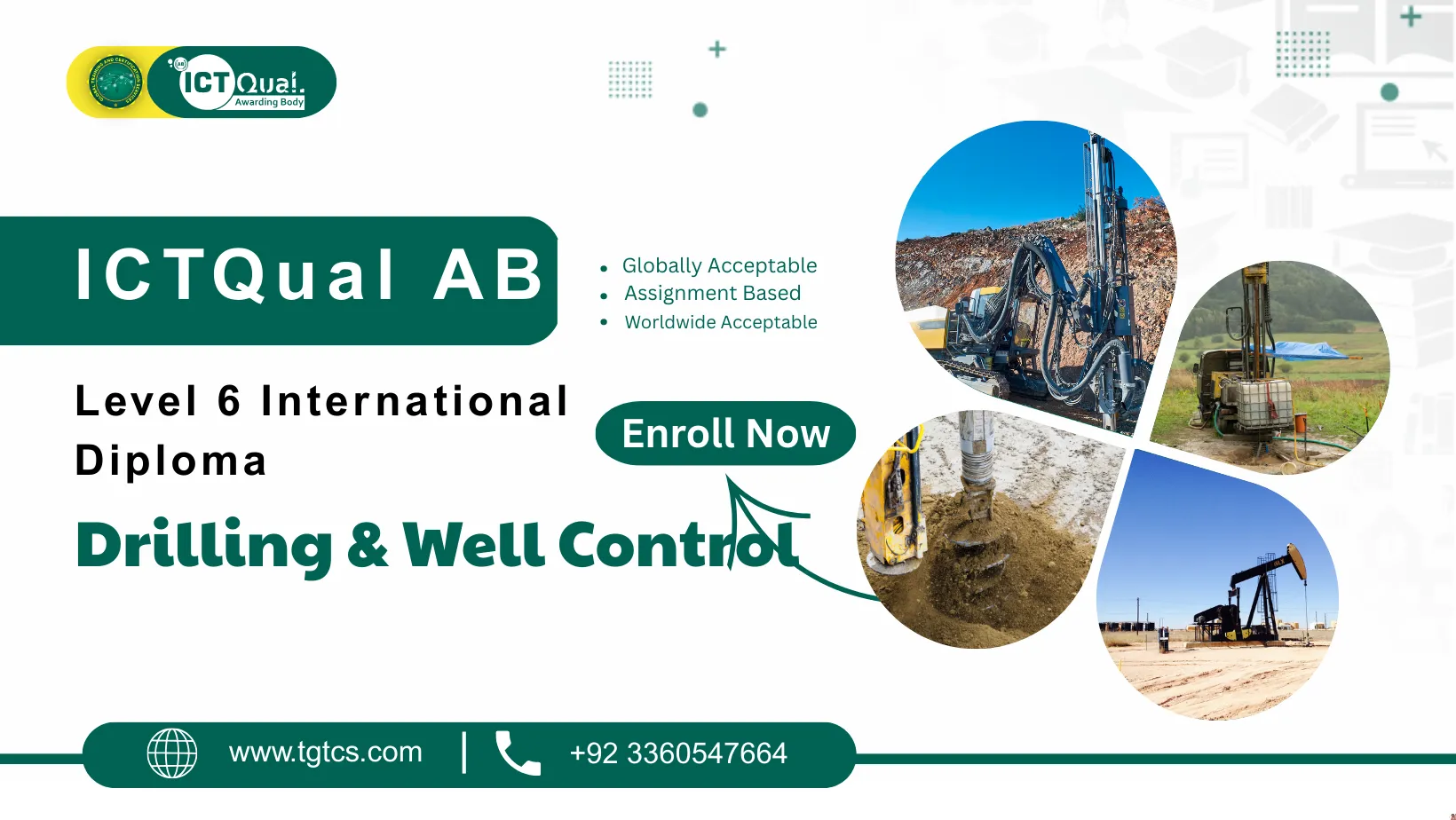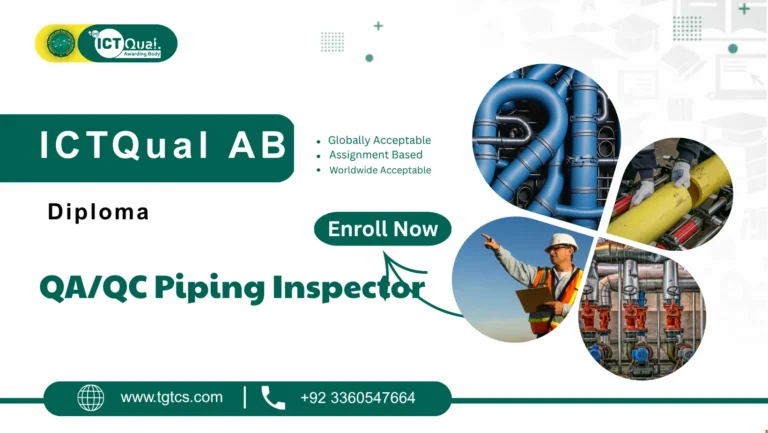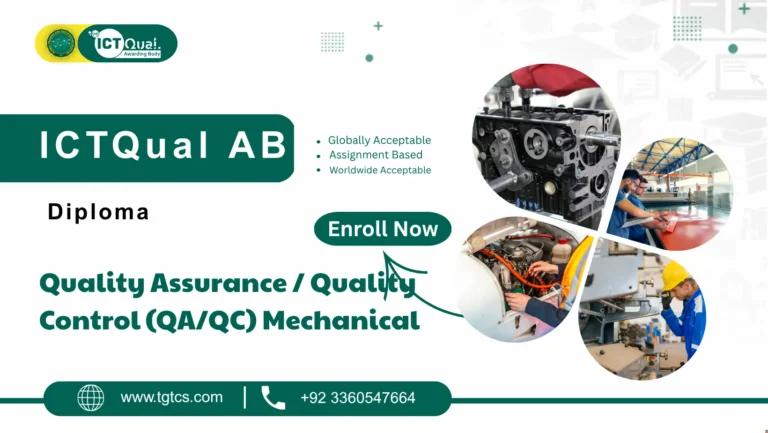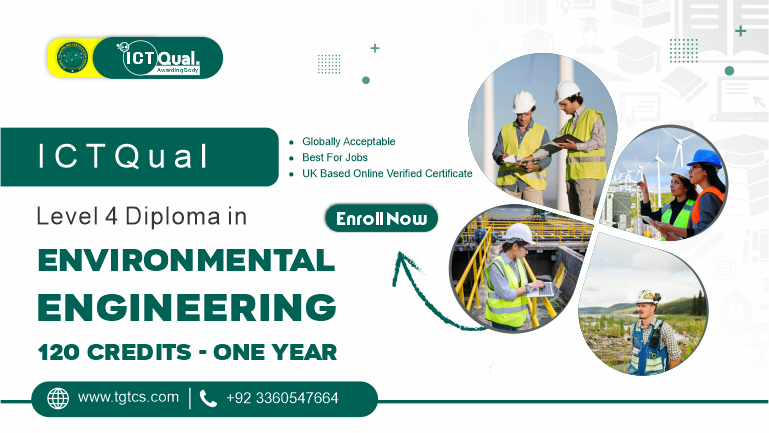ICTQual AB Level 6 International Diploma in Drilling & Well Control
The oil and gas industry relies heavily on safe and efficient drilling operations, making expertise in drilling and well control crucial for both operational success and workforce safety. The ICTQual AB Level 6 International Diploma in Drilling & Well Control is designed to equip learners with advanced technical knowledge, practical skills, and strategic insights required to manage complex drilling operations and maintain well integrity under challenging conditions.
This comprehensive program provides a deep understanding of drilling engineering, well control principles, safety protocols, and risk management strategies. Learners will explore topics such as blowout prevention, pressure control, well design, drilling fluids management, and offshore and onshore drilling operations. By integrating theory with practical applications, the course prepares participants to handle real-world challenges, optimize drilling performance, and ensure compliance with international safety standards.
Throughout the curriculum, students develop proficiency in using industry-standard tools and simulation software to monitor well operations, identify hazards, and implement corrective measures. Emphasis is placed on critical thinking, problem-solving, and decision-making skills, enabling learners to respond effectively to operational risks and emergencies. Additionally, the program enhances leadership and project management capabilities, preparing participants for senior technical and managerial roles within the energy sector.
Graduates of this diploma will be prepared for career opportunities as drilling engineers, well control specialists, production managers, and energy consultants. With British Council verifiable, MOFA and Embassy attestable certification, this qualification provides international recognition and credibility, making it ideal for career advancement, job placement, and Iqama approval.
The Global Training and Certification Services is Approved Training Centre of ICTQual AB UK Ltd
Start your professional journey with the ICTQual AB Level 6 International Diploma in Drilling & Well Control, a globally recognized qualification designed to provide advanced knowledge and practical skills in drilling operations and well control.
Flexible, Assignment-Based Learning
- Fully 360-credit program, entirely assignment-based.
- Study at your own pace from anywhere in the world.
- Suitable for both fresh graduates and experienced professionals.
International Recognition
- British Council verifiable, ensuring global credibility.
- MOFA and Embassy attestable, ideal for international documentation.
- Highly valued for career advancement, job opportunities, and Iqama approval.
Suitable for Fresh Learners
- Complete all 36 mandatory assignments within three years.
- Gain comprehensive knowledge in drilling engineering, well integrity, blowout prevention, and offshore/onshore operations.
Fast-Track Option for Experienced Professionals
- Submit verifiable evidence of 6+ years of relevant work experience.
- Demonstrate expertise in professional discussion meetings with an ICTQual AB Approved Assessor.
- Achieve certification without completing all mandatory assignments, saving time while recognizing prior experience.
Career-Enhancing Skills
- Develop technical, analytical, and leadership skills in drilling and well control.
- Prepare for roles such as drilling engineer, well control specialist, production manager, and energy consultant.
- Contribute effectively to safe and efficient oil and gas operations globally.
By completing the ICTQual AB Level 6 International Diploma in Drilling & Well Control, learners will gain a globally recognized qualification that empowers them to advance their careers, achieve professional credibility, and excel in the competitive oil and gas sector.
Mandatory Unit
This qualification, the ICTQual AB Level 6 International Diploma in Drilling & Well Control, consists of 36 mandatory units.
Year 1 – Foundation in Drilling & Well Control
- Principles of Drilling & Well Control
- Introduction to Petroleum Exploration and Production
- Drilling Rig Components and Operations
- Construction Materials and Methods in Drilling Projects
- Drilling Fluids and Wellbore Stability
- Project Planning and Scheduling in Drilling Operations
- Health, Safety, and Environmental Awareness in Drilling
- Communication and Stakeholder Management in Drilling Projects
- Digital Tools and Simulation Software in Drilling
- Financial Management in Drilling Projects
- Quality Assurance and Control in Well Operations
- Legal and Regulatory Frameworks in Drilling
Year 2 – Intermediate Drilling & Well Control Practices
- Advanced Drilling Techniques and Directional Drilling
- Well Design and Engineering Principles
- Pressure Control and Well Control Methods
- Casing, Cementing, and Well Completion Techniques
- Procurement and Supply Chain Management in Drilling Projects
- Risk Assessment and Mitigation in Drilling Operations
- Leadership and Team Management in Drilling Projects
- Offshore and Onshore Operations Management
- Sustainability and Environmental Management in Drilling
- Project Monitoring and Reporting in Drilling Projects
- Problem-Solving and Decision-Making in Well Operations
- Communication and Negotiation Skills in Drilling Projects
Year 3 – Advanced Drilling & Well Control and Strategic Leadership
- Strategic Project Management in Drilling Operations
- Advanced Well Engineering and Production Optimisation
- Reservoir and Formation Evaluation for Drilling Projects
- Innovation and Emerging Technologies in Drilling
- Advanced Risk and Crisis Management in Well Control
- Contract Management and Legal Compliance in Drilling Projects
- Leadership in Drilling and Well Control Operations
- Advanced Project Control and Performance Measurement
- Project Governance and Compliance in Well Operations
- Research Methods and Project Analysis in Drilling
- Capstone Project in Drilling & Well Control
- Professional Development and Career Planning
The ICTQual AB Level 6 International Diploma in Drilling & Well Control equips learners with advanced technical knowledge, practical skills, and strategic expertise required to excel in the global oil and gas industry.
Year 1 – Foundation in Drilling & Well Control
Principles of Drilling & Well Control
- Understand fundamental concepts and terminology in drilling and well control.
- Explore the basics of well integrity, pressure management, and drilling operations.
- Apply theoretical principles to practical drilling scenarios.
- Recognize operational risks and safety considerations in drilling projects.
Introduction to Petroleum Exploration and Production
- Gain insight into the exploration lifecycle and production methods.
- Understand reservoir identification, drilling, and extraction processes.
- Learn upstream and downstream oil and gas operations.
- Identify challenges in petroleum exploration and production.
Drilling Rig Components and Operations
- Understand rig equipment and its functions in drilling operations.
- Learn operational procedures for rig setup, maintenance, and monitoring.
- Apply knowledge of rig components to optimize performance.
- Ensure safety compliance during rig operations.
Construction Materials and Methods in Drilling Projects
- Identify materials used in drilling infrastructure.
- Understand construction techniques for wells, rigs, and pipelines.
- Evaluate materials for durability, cost, and safety.
- Implement efficient and sustainable construction practices.
Drilling Fluids and Wellbore Stability
- Understand types and functions of drilling fluids.
- Apply fluid properties to maintain wellbore stability.
- Monitor drilling parameters to prevent formation damage.
- Implement safety and environmental practices in fluid management.
Project Planning and Scheduling in Drilling Operations
- Develop project plans with clear objectives, timelines, and milestones.
- Use scheduling tools for drilling operations.
- Monitor project progress and resource allocation.
- Identify and resolve project delays efficiently.
Health, Safety, and Environmental Awareness in Drilling
- Comprehend regulatory requirements in drilling operations.
- Develop safety management plans for field operations.
- Identify hazards and implement mitigation strategies.
- Promote environmental sustainability in drilling projects.
Communication and Stakeholder Management in Drilling Projects
- Build effective communication with teams and stakeholders.
- Manage expectations and resolve conflicts.
- Develop professional reporting and presentation skills.
- Enhance collaboration across multidisciplinary teams.
Digital Tools and Simulation Software in Drilling
- Use industry-standard software for drilling simulation and analysis.
- Apply digital tools for monitoring well parameters.
- Evaluate data to support engineering decisions.
- Optimize drilling performance using technology-driven solutions.
Financial Management in Drilling Projects
- Understand budgeting, cost estimation, and financial analysis.
- Monitor project expenses and optimize resource use.
- Apply financial models to evaluate project feasibility.
- Make informed financial decisions for operational efficiency.
Quality Assurance and Control in Well Operations
- Implement QA/QC procedures in drilling projects.
- Monitor compliance with industry standards and safety regulations.
- Identify deficiencies and implement corrective measures.
- Maintain high-quality standards throughout operations.
Legal and Regulatory Frameworks in Drilling
- Understand local and international drilling laws and regulations.
- Apply compliance knowledge in well control operations.
- Manage legal risks in drilling projects.
- Ensure ethical and professional conduct in operations.
Year 2 – Intermediate Drilling & Well Control Practices
Advanced Drilling Techniques and Directional Drilling
- Apply advanced drilling methods to optimize efficiency and safety.
- Understand directional and horizontal drilling operations.
- Analyze well trajectories and implement corrective actions.
- Monitor drilling performance and troubleshoot operational challenges.
Well Design and Engineering Principles
- Develop well designs based on reservoir and formation characteristics.
- Apply engineering principles for safe and effective drilling.
- Optimize wellbore construction and integrity.
- Evaluate design decisions for cost and operational efficiency.
Pressure Control and Well Control Methods
- Understand pressure management techniques in drilling operations.
- Apply blowout prevention and well control methods.
- Monitor pressure parameters to ensure well integrity.
- Implement safety measures to prevent well control incidents.
Casing, Cementing, and Well Completion Techniques
- Learn proper casing and cementing procedures for well stability.
- Apply completion methods to optimize production.
- Ensure operational efficiency and safety in well construction.
- Evaluate materials and techniques for sustainable operations.
Procurement and Supply Chain Management in Drilling Projects
- Plan procurement strategies for equipment, materials, and services.
- Manage supply chains for onshore and offshore operations.
- Ensure timely delivery and cost-effective resource allocation.
- Monitor supplier performance and maintain quality standards.
Risk Assessment and Mitigation in Drilling Operations
- Identify potential operational, financial, and environmental risks.
- Develop mitigation strategies and contingency plans.
- Implement safety measures and monitor effectiveness.
- Enhance decision-making under high-risk conditions.
Leadership and Team Management in Drilling Projects
- Develop leadership skills for managing drilling teams.
- Apply effective team management and delegation techniques.
- Resolve conflicts and enhance collaboration across teams.
- Foster a safe and productive work environment.
Offshore and Onshore Operations Management
- Understand operational procedures in both offshore and onshore drilling.
- Manage logistics, workforce, and equipment efficiently.
- Ensure compliance with safety regulations and standards.
- Optimize operational performance in diverse environments.
Sustainability and Environmental Management in Drilling
- Implement environmentally sustainable practices in drilling projects.
- Monitor compliance with environmental regulations.
- Develop strategies to reduce waste and energy consumption.
- Integrate sustainability into operational planning and execution.
Project Monitoring and Reporting in Drilling Projects
- Track project progress using key performance indicators.
- Prepare comprehensive reports for stakeholders.
- Identify deviations and recommend corrective actions.
- Ensure timely delivery and quality of project outputs.
Problem-Solving and Decision-Making in Well Operations
- Analyze complex engineering and operational challenges.
- Apply structured problem-solving methodologies.
- Make informed decisions under operational pressure.
- Evaluate outcomes and implement continuous improvement strategies.
Communication and Negotiation Skills in Drilling Projects
- Develop professional communication strategies for technical and managerial contexts.
- Negotiate contracts, agreements, and resource allocation effectively.
- Resolve conflicts and build long-term professional relationships.
- Present technical information clearly to support decision-making.
Year 3 – Advanced Drilling & Well Control and Strategic Leadership
Strategic Project Management in Drilling Operations
- Develop strategies for managing complex drilling projects efficiently.
- Align project objectives with organizational goals and industry standards.
- Implement effective project monitoring and performance evaluation.
- Apply leadership and decision-making skills for strategic outcomes.
Advanced Well Engineering and Production Optimisation
- Analyze well performance and optimize production strategies.
- Apply advanced techniques in well design and reservoir management.
- Evaluate production data to enhance efficiency and recovery.
- Implement best practices for well integrity and operational safety.
Reservoir and Formation Evaluation for Drilling Projects
- Conduct detailed reservoir and formation assessments for drilling planning.
- Use analytical tools to evaluate rock, fluid, and pressure characteristics.
- Integrate evaluation findings into well design and operational decisions.
- Mitigate formation-related risks during drilling operations.
Innovation and Emerging Technologies in Drilling
- Explore emerging drilling technologies, automation, and digital tools.
- Implement innovative solutions to improve operational efficiency and safety.
- Evaluate the impact of new technologies on drilling and well control.
- Integrate technological advancements into project planning and execution.
Advanced Risk and Crisis Management in Well Control
- Identify and assess high-level operational and safety risks.
- Develop crisis management and emergency response strategies.
- Implement mitigation measures to prevent well control incidents.
- Monitor and evaluate risk management effectiveness continuously.
Contract Management and Legal Compliance in Drilling Projects
- Manage contracts, agreements, and compliance with regulatory standards.
- Understand legal frameworks in local and international drilling projects.
- Resolve disputes and maintain professional ethics in operations.
- Ensure all operations adhere to legal and corporate requirements.
Leadership in Drilling and Well Control Operations
- Enhance leadership skills for managing multidisciplinary teams.
- Foster collaboration and productivity in high-pressure environments.
- Develop strategic decision-making capabilities for operational success.
- Mentor and guide teams to achieve project objectives effectively.
Advanced Project Control and Performance Measurement
- Apply project control techniques to monitor costs, schedules, and quality.
- Use KPIs and metrics to evaluate project performance.
- Implement corrective actions to optimize outcomes.
- Ensure projects are completed on time, within budget, and to specification.
Project Governance and Compliance in Well Operations
- Establish governance frameworks for drilling projects.
- Monitor compliance with industry, environmental, and safety standards.
- Promote transparency and accountability in operations.
- Maintain high ethical and professional standards in all activities.
Research Methods and Project Analysis in Drilling
- Conduct research on drilling methods, technologies, and industry trends.
- Analyze project performance using qualitative and quantitative methods.
- Develop data-driven insights for operational improvements.
- Integrate research findings into practical drilling solutions.
Capstone Project in Drilling & Well Control
- Plan and execute a major project integrating all learned concepts.
- Apply technical, analytical, and strategic skills to real-world challenges.
- Demonstrate comprehensive knowledge in drilling and well control.
- Present findings professionally to stakeholders and assessors.
Professional Development and Career Planning
- Develop a personalized roadmap for career progression in drilling and well control.
- Identify opportunities for specialization and professional growth.
- Enhance leadership, networking, and lifelong learning skills.
- Prepare for senior technical, managerial, and consultancy roles in the oil and gas sector.
Start your professional journey with the ICTQual AB Level 6 International Diploma in Drilling & Well Control, designed to provide learners with the technical expertise, practical skills, and international recognition needed to succeed in the oil and gas sector.
Comprehensive Technical Knowledge
- Gain in-depth understanding of drilling engineering, well control, and reservoir management.
- Learn advanced techniques in blowout prevention, pressure control, and well integrity.
- Understand both onshore and offshore drilling operations and procedures.
- Develop expertise in project planning, scheduling, and operational efficiency.
Practical Skills and Industry Applications
- Apply theoretical knowledge to real-world drilling and well control scenarios.
- Use digital tools and simulation software for well monitoring and analysis.
- Enhance problem-solving, decision-making, and risk mitigation capabilities.
- Implement safety and environmental best practices in drilling projects.
Career Advancement and Global Recognition
- Achieve a qualification that is British Council verifiable, MOFA and Embassy attestable, and internationally recognized.
- Suitable for Iqama approval and global employment opportunities.
- Open doors to senior roles such as drilling engineer, well control specialist, production manager, and energy consultant.
Flexible, Self-Paced Learning
- Complete a fully assignment-based program at your own pace from anywhere in the world.
- Fresh learners complete all 36 mandatory assignments within three years.
- Experienced professionals can fast-track certification through professional discussion assessments.
Strategic Leadership and Professional Development
- Develop leadership, team management, and stakeholder communication skills.
- Gain expertise in contract management, governance, and compliance.
- Prepare for senior technical and managerial positions in global oil and gas projects.
By completing the ICTQual AB Level 6 International Diploma in Drilling & Well Control, learners will be fully equipped to excel in the oil and gas industry, advance their careers, and gain internationally recognized professional credibility.
Start your journey with the ICTQual AB Level 6 International Diploma in Drilling & Well Control by understanding who will benefit most from this advanced qualification. This course is tailored for learners seeking technical expertise, practical skills, and international recognition in drilling and well control operations.
Aspiring Drilling Engineers
- Build foundational and advanced knowledge in drilling operations and well control.
- Prepare for entry-level technical positions in oil and gas projects.
Energy Project Managers and Supervisors
- Enhance project management, risk assessment, and team leadership skills.
- Manage drilling operations efficiently, both onshore and offshore.
Industry Consultants and Analysts
- Understand drilling, production, and reservoir evaluation to provide expert consultancy.
- Analyze operational data and optimize project performance for clients.
Fresh Graduates and Career Starters
- Gain a globally recognized, assignment-based certification at your own pace.
- Develop essential technical and leadership skills to enter the competitive oil and gas industry.
Experienced Professionals Seeking Fast-Track Recognition
- Validate prior experience via professional discussion assessments.
- Achieve certification quickly while demonstrating competence and expertise in drilling and well control.
By completing this course, learners will be fully equipped to advance their careers, gain international recognition, and excel in the global oil and gas industry.
Course Overview
Course Level
Level 6
Course Units
36 Units
Credits
360
Duration
3 years






